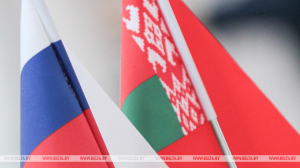Ru
|
Eng
Skolkovo Foundation interested in Belarus’ Academy of Sciences’ R&D product assimilation experience
28.03.2024

MOSCOW, 28 March (BelTA) – The Skolkovo Foundation’s interaction with Belarus is not a one-sided game but cooperation, BelTA learned from Alexander Okunev, Skolkovo Foundation Deputy Vice President for Regional Development and Interaction with the CIS.
According to Alexander Okunev, Belarusian-Russian projects and R&D products in the Skolkovo territory have a long and deep history. Belarusian companies rather actively participate in startup processes. Russian producers walk down the path of manufacturing cooperation and integration the same way. “The history of interaction began in the first days after Skolkovo’s foundation,” he said. “Our main partner in Belarus is the State Committee on Science and Technology. We have very tight links to it. Credit where credit is due: Belarus actively works not only together with Russia but also across the entire space of the Commonwealth of Independent States and the Eurasian economic community. This is why Belarusian colleagues pay attention to the Skolkovo Foundation.”
The foundation’s second partner in Belarus is the Minsk City Technopark. The Skolkovo Foundation and the Minsk City Technopark have been tightly interacting for many years. According to Alexander Okunev, it is a very interesting and promising venue for joint work. Another vector of cooperation is Belarusian regions: tight mutual connections have evolved with Vitebsk Oblast recently. A visit of Chairwoman of the Belarusian state light industry concern Bellegprom Tatiana Lugina to the Skolkovo Foundation last week gives hope for long-term promising cooperation. She was made familiar with the R&D products, which light industry enterprises could assimilate in the future. For instance, a scanning system was presented. It can take human measurements without touching the person, determine the size of the clothes, and select an appropriate color of the clothes. Projects relating to energy effectiveness, industrial design, and ecology were also presented. “It is our new partner, with which we’ve agreed to tightly interact in the future,” he stressed.
“We are also interested in companies, which R&D products win prizes at Belarusian contests,” the official continued. “Belspetskomplekt is one of them. We are starting to actively work with the company and help it penetrate the Russian market. After all, the Skolkovo Foundation’s interaction with the Republic of Belarus is in no way a one-sided game but cooperation. Belarusian companies reach out to us in order to promote their products onto the Russian market. Certainly, we help them with it.”
According to Alexander Okunev, at present the foundation has over 4,000 participants. A number of Belarusian companies, which become participants of the Skolkovo project, get the status of Russian legal persons and beneficiaries. And companies, which are located in Belarus’ territory, keep profits from selling their products. “In this manner they use the preferences available to Skolkovo project participants and penetrate markets,” he stressed. “Russian companies, including our participants, use the same principle to work with the Minsk City Technopark. They are interested in penetrating the Belarusian market and they understand perfectly well that they have to create jobs and interact with the local scientific community if they want support from executive government bodies in Belarus. I am glad that the number of such companies is rising: more than 250 are engaged in this exchange at present.”
Joint events are also often organized for startups with a view to promoting integration and interaction, including in Skolkovo’s territory. Belarusian companies and developers always participate in them.
SCIENCE. TECHNOLOGY. INNOVATIONS
13.08.2024
28.06.2024
28.06.2024
25.06.2024
05.06.2024
15.05.2024
15.05.2024
26.04.2024
26.04.2024
26.04.2024













